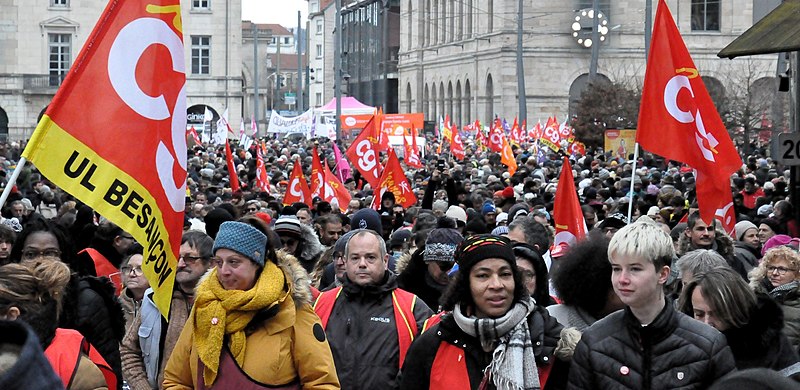
Yesterday, for the eleventh time in 10 months, Prime Minister Élisabeth Borne invoked article 49.3 of the French Constitution, to force through Macron’s hated pension reforms without a parliamentary vote. This, however, did not go unnoticed. In the hours following the Prime Minister’s announcement, thousands of people gathered at the Place de la Concorde in Paris to denounce the manoeuvre. Spontaneous rallies took place in other cities.
The mainstream media and the parliamentary opposition are stressing that this is a major “failure” for Macron, who would have preferred a formal vote in the National Assembly on his pension reform. It is indeed a failure, but one that logically follows another failure, or rather a debacle: that of Macron’s party (LREM) in the legislative elections last June. Macron does not have a majority in the National Assembly. Hence the use of article 49.3, considered a ‘nuclear option’.
Early next week, motions of no confidence will be put to a vote in the National Assembly. If one of them wins a majority, Macron will probably not simply be able to reshuffle his government: he will have to dissolve the National Assembly. But precisely for this reason, it is unlikely that a motion of no confidence will win a majority. A significant number of opposition MPs do not want early parliamentary elections.
Last November, we wrote: “Republican MPs [the traditional right-wing bourgeois party] have nothing good to expect from early elections, in the immediate future. The National Rally’s deputies [formally National Front, led by Marine Le Pen] are presenting themselves as the fanatical supporters of the motion of no confidence, but in reality they have every interest in letting the situation continue to rot in order to reap the maximum benefits when the time comes. Even in the ranks of the NUPES [the left-wing opposition bloc, led by Jean-Luc Mélenchon of France Insoumise], a number of Green, PS [Socialist Party] and PCF deputies [French Communist Party] are saying to themselves, from their velvet seats: ‘I’m in now, so I’m staying in!’ As a result, all these little people are organising, in advance of motions of no confidence, to make sure that they don’t pass.”

It is true that, under the pressure of the mass movement against the pension reform, and given the deep internal crisis in the Republicans, one cannot totally exclude an ‘accident’ that results in the adoption of a motion of no confidence. But this is not the most likely scenario. For example, it is worth noting that, among the Republican deputies who were staunchly ‘opposed’ to the pension reform, several are much more evasive about motions of no confidence. Similarly, some of the more moderate elements of the parliamentary left may abstain.
The direction of the movement
Amongst the workers involved in the two-month-long strike movement against the counter-reform, the mood is very angry. Impromptu demonstrations took place in Paris and other cities on the day the government invoked article 49.3. On Friday 17 March, the workers at the Total Normandie refinery, the largest in the country, voted to shut down the plant. The CGT Energy union was talking of electricity cut offs. Clearly, the trade union leaders are under a lot of pressure from the rank and file which sees the need for immediate action.
Can the use of article 49.3 have the effect of reviving the extra-parliamentary struggle against the pension reform – and in particular the participation of workers in the movement of indefinite strikes? The next few days will tell. However, we can already underline two things:
Firstly, the use of article 49.3 does not at all change the serious deficiencies of the strategy of the trade union leaderships since the beginning of this struggle. Before and after the use of article 49.3, the strategy of “days of action” cannot make the government back down.
Instead of calling for a properly organised escalation of the strike movement, towards an all-out general strike, the Intersyndicale unions met and agreed … to call yet another day of action on Thursday, 23 March, after the motion of no confidence is discussed in Parliament on Monday.
The day of action next Thursday, however strong it may be, will not change anything in this respect. Moreover, before as well as after the use of article 49.3, the strictly defensive character of the only slogan put forward by the trade union leaderships – the “withdrawal of the pension reform” – is an obstacle to the development of indefinite strikes, but also to the massive mobilisation of the youth. We explained this in detail in our January, February and March editorials.
Secondly, in the aftermath of article 49.3, a number of leaders of the left and the trade union movement are increasingly insisting on the prospect of fighting the pension reform by means of a “shared initiative referendum” – or even an appeal to the Constitutional Council! This can only weaken the indefinite strikes. Many workers will say to themselves: “what’s the point of striking if there are other ways of achieving the same result?”
So far, the rolling strike movement has not gained the momentum needed to push the government back. The most mobilised sectors – and in particular the bin men, dockers and oil workers – will not be able to hold out indefinitely without an extension of the movement. But in the aftermath of article 49.3, nothing is being done by the leadership of the left and the trade union movement to extend the struggle. This is a fact – one that risks making a much more significant impact than the indignation provoked by article 49.3.
The tragedy of the situation is that no leadership is being offered. All unions have signed the joint statement calling for “calm and determined action”, when what is needed is a bold lead. What would be required now are proper, mass General Assemblies in the workplaces, coordinated through a network of elected and recallable delegates, to take the reins of the movement. The working class has immense power and the French working class has shown, once and again, its willingness to fight. Unfortunately, its trade union and political leaders have not been up to the task. A revolutionary leadership is needed.

